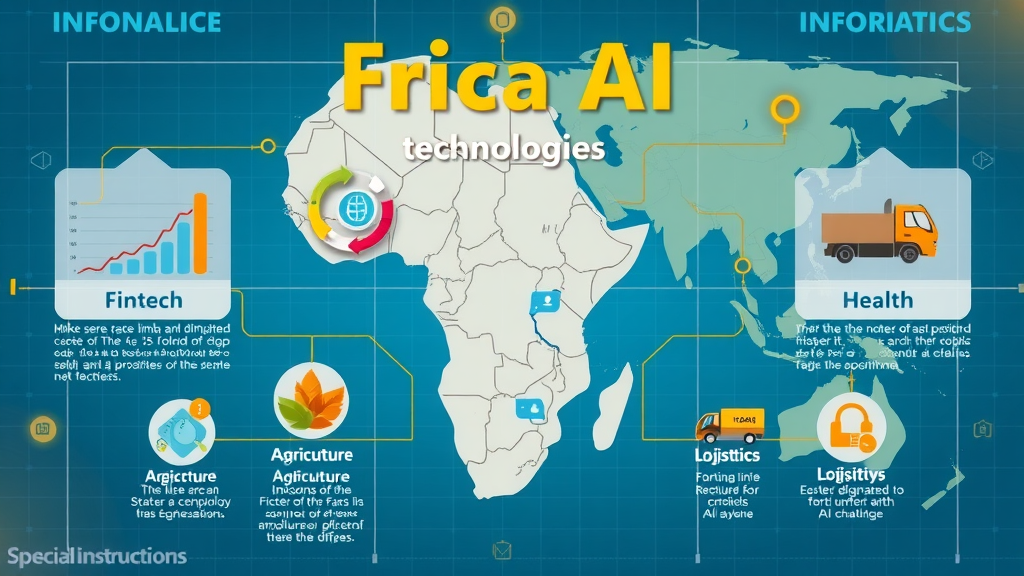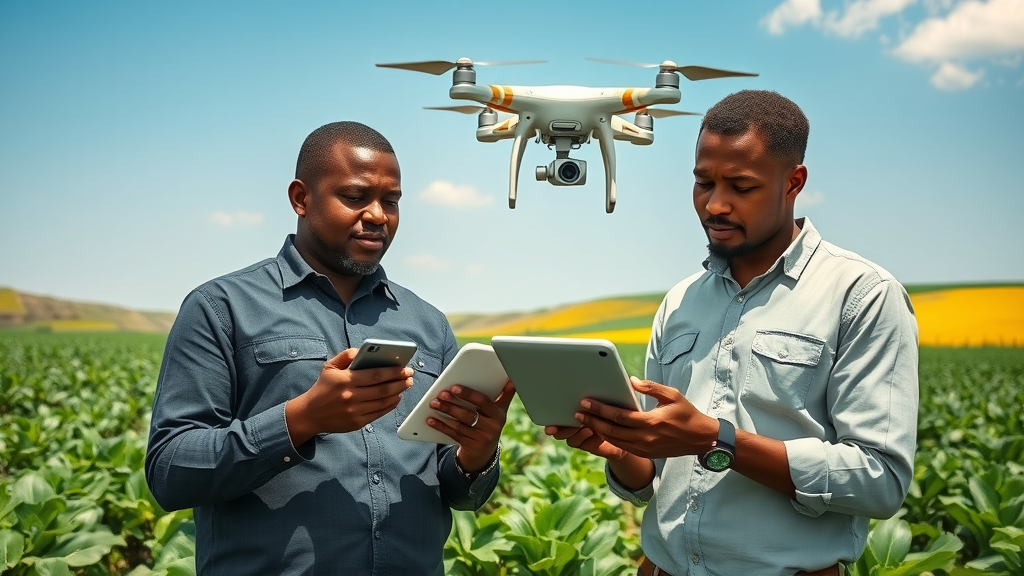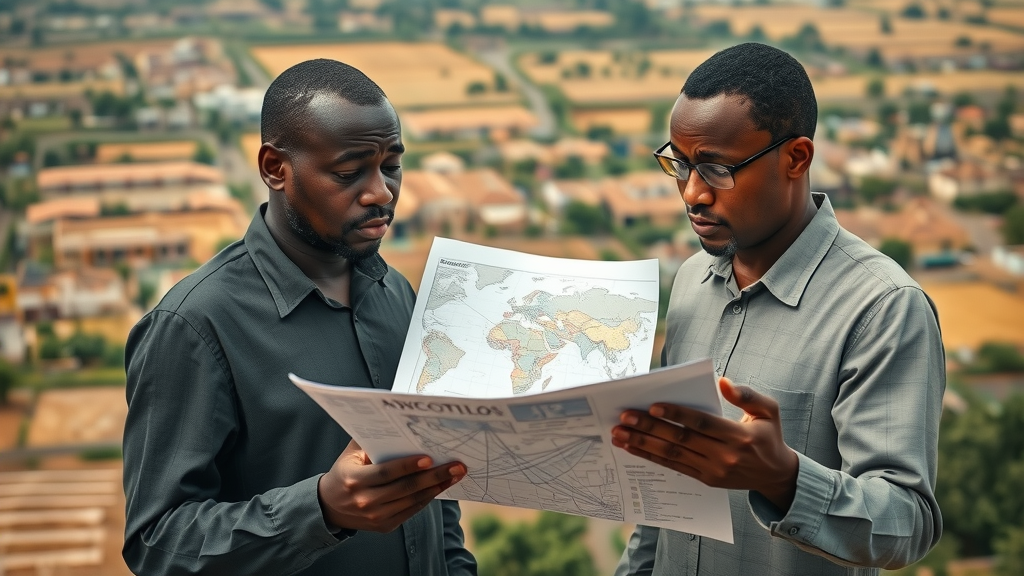Did you know that fewer than 20% of African countries have a national AI strategy in place, according to UNESCO? This statistic underscores both a critical gap and a massive opportunity. As the digital revolution accelerates worldwide, the top AI technologies Africa must embrace are no longer a futuristic vision—they are essential engines for economic development, inclusive growth, and driving the continent into the global innovation spotlight.
If you’re ready to explore how AI is actively transforming African industries—from financial services and agriculture to education and health—read on. Plug into real case studies, actionable insights, and discover how Africa's tech ecosystem is sprinting towards a smarter, more equitable future powered by the latest artificial intelligence advances.
Why the Top AI Technologies Africa Must Adopt Will Shape the Continent’s Future
Across African countries , the adoption of the top AI technologies Africa has emerged as a make-or-break factor in the race for economic modernization and global competitiveness. With Africa’s population expected to surpass 2.5 billion by 2050, leveraging artificial intelligence is not just about catching up—it's about leapfrogging legacy barriers and inventing new possibilities. Recent years have seen a surge in AI startups and ambitious AI companies building homegrown solutions in urban centers from Lagos and Nairobi to Cape Town and Accra.
For nations such as South Africa, Nigeria, and Kenya , investing in AI is now a national priority . This push is reshaping critical sectors: financial services are deploying predictive AI models to expand financial inclusion, agricultural AI is helping farmers optimize yields, and AI-driven health platforms are revolutionizing patient care in underserved regions. Rapid adoption of AI across these areas positions Africa not only as a fast follower but potentially a global AI trailblazer.

"According to UNESCO, fewer than 20% of African countries currently have a national AI strategy—highlighting the immense gap and opportunity for tech-driven growth."
- The rapid growth of AI startups and AI companies in African countries
- Why artificial intelligence adoption is a national priority for South Africa, Nigeria, and Kenya
- African AI innovation transforming financial services, agriculture, and health
What You’ll Discover in This Guide to the Top AI Technologies Africa Needs
In this comprehensive breakdown, you'll gain clarity on which artificial intelligence trends and top AI technologies Africa should zero in on for scalable impact. We’ll cover the latest AI applications changing the continent’s landscape, profile leading african ai startups blazing new trails, and show how national AI strategies can drive lasting transformation from the grassroots up.
- The most impactful top AI technologies Africa should prioritize
- Real-world examples of artificial intelligence adoption by leading African AI companies and startups
- How African countries can leapfrog global competitors using cutting-edge AI solutions
Comparing the Top AI Technologies in Africa: Global and Local Trends
The spectrum of AI innovation in Africa is diverse—combining global advances with unique local market needs. South Africa's robust AI research output, for example, contrasts with Kenya’s creative mobile-first rollout and Nigeria’s boom in fintech-centric ai startups . Successful AI solutions often blend international best practices with African ingenuity, offering a blueprint for scalable development not only on the continent but in emerging markets globally.
Understanding which AI models and deployment strategies popular AI companies utilize in different industries enables decision-makers to tailor effective national approaches and unlock the true value of AI in Africa . Below is an at-a-glance table summarizing top technologies, leading players, national strategies, and primary use cases:
| AI Technology | Top African AI Companies/Startups | Countries With National AI Strategies | Key Use Cases |
|---|---|---|---|
| Natural Language Processing (NLP) | SpeakAI, VEEZETA, InstaDeep | South Africa, Egypt, Tunisia | Financial inclusion, health appointment booking, logistics |
| Computer Vision | Aerobotics, N-Frnds | South Africa, Kenya | Crop monitoring, infrastructure management |
| Predictive Analytics | M-KOPA, Health AI Projects | Kenya, Ghana, South Africa | Credit scoring, outbreak prediction |
| AI-Powered Chatbots | Ajua, AceOnData | Kenya, Nigeria | Customer service, multilingual support |
| Machine Learning for Energy | Rensource Energy, ClimaCell | Nigeria, South Africa | Renewable energy grids, climate modeling |

1. Natural Language Processing (NLP): Breaking Barriers in African AI
How NLP Supports Local Languages and AI Innovation
One of the most transformative AI solutions for african countries is Natural Language Processing (NLP) . Given Africa’s tapestry of over 2,000 languages and dialects, local language support and inclusive AI applications are crucial for digital transformation. NLP empowers chatbots, voice assistants, and translation tools to understand and respond to users in Swahili, Yoruba, Amharic, and other African languages , bridging long-standing communication barriers. For millions, interacting in their native language means better access to public service information, mobile banking, and digital healthcare.
The evolution of NLP-driven AI models is also enabling African firms and AI startups to build accurate sentiment analysis tools and real-time translation services tailored to the continent’s unique context. As more african ai companies train AI on local datasets, accuracy and cultural relevance improve. The continued investment in NLP is a vital springboard for digital inclusion across urban and rural populations, and a stronghold for wider AI innovation in the African digital economy.

African AI Startups and Companies Using NLP Solutions
- SpeakAI (Nigeria): Voice-driven financial services for underbanked populations
- VEEZETA (Egypt): Chatbot-based health appointment scheduling
- InstaDeep: NLP-driven logistics and operations
These pioneering AI startups exemplify Africa's push toward relevant, socially impactful technology. SpeakAI is unlocking access to critical banking services through speech recognition in native tongues. VEEZETA ’s chatbots are optimizing patient flows in busy hospitals. Meanwhile, InstaDeep blends NLP with logistics optimization, tackling supply chain bottlenecks from Cairo to Cape Town. These real-world solutions illustrate how local language AI solutions are as much about social equity as they are about technological advancement.
2. Computer Vision Revolutionizing Agriculture & Infrastructure in African Countries
AI Solutions for Crop Monitoring and Smart Cities
Computer vision technology is redefining agricultural operations and infrastructure development in Africa. Drones, smart sensors, and machine learning models automate the detection of crop diseases, soil health variance, and pest outbreaks—key support systems for Africa’s large rural workforce. For example, AI-enabled cameras capture and analyze real-time images of farmland, helping farmers make rapid, data-driven decisions and increasing harvest yields.
Beyond the fields, computer vision is the backbone of emerging smart city projects. AI-powered surveillance, waste management, and traffic monitoring in cities such as Nairobi and Johannesburg use vision-based analytics for safer, greener, and more efficient urban environments. By merging local needs with world-class AI research from south african and Kenyan universities, this technology helps African cities leap over traditional infrastructure roadblocks into digital-first futures.

African AI Research Driving Computer Vision in South Africa and Beyond
- Aerobotics (South Africa): AI-powered pest and crop analysis
- N-Frnds (Kenya): Infrastructure monitoring using computer vision
Aerobotics brings together AI, drones, and agricultural data to help South African farms detect threats early, saving millions in crop losses annually. N-Frnds in Kenya deploys vision tech for rural infrastructure monitoring, quickly identifying maintenance needs and improving public service delivery. Such AI research highlights not only the depth of local innovation but also the scalability of these models across other African countries .
3. Predictive Analytics: Supporting Financial Services & Public Health
Financial Services Transformation via Predictive AI
Financial inclusion is at the heart of Africa's digital transformation, and predictive analytics represents a core AI model changing the financial services sector. By analyzing user transaction history, mobile payment data, and behavioral trends, predictive AI tools determine creditworthiness, reduce risk, and enable the creation of tailored financial products for the unbanked and underbanked. From micro-loans to insurance, AI-driven systems fuel rapid growth among fintech ai startups .
Many banks and mobile money providers use these tools to proactively detect fraud, spot market trends, and optimize the supply chain management of financial resources. Predictive analytics also enhances regulatory compliance, empowering financial institutions to serve millions who were previously excluded due to limited credit data—transforming not just profits, but livelihoods.

National AI Policies Focusing on Predictive Analysis
- M-KOPA (Kenya): Predictive credit scoring
- Health AI Projects (Ghana, South Africa): Outbreak prediction & planning
Countries like Kenya, through M-KOPA , are pioneering the use of AI for credit evaluation on a massive scale, driving both financial empowerment and resilience. Health ministries in Ghana and South Africa deploy predictive analytics to model disease outbreaks, informing swift public health interventions—a use case the COVID-19 pandemic made even more urgent. Such national ai strategy shows the practical value of AI for both economic stability and crisis response across diverse african countries .
4. AI-Powered Chatbots: Expanding Customer Service in African Companies
African AI Startups Revolutionizing Customer Support
Increasing customer expectations and the explosion of mobile connectivity have made AI-powered chatbots indispensable for businesses and public services in Africa. These smart bots offer 24/7 support across languages, help resolve queries, facilitate transactions, and often serve as the first touchpoint for millions experiencing digital services for the first time. Their adoption is especially pronounced in e-commerce, banking, health, and government public service offices.
Implementing chatbots allows african ai startups and established companies to offer scalable, cost-effective customer support while collecting invaluable feedback data—fueling further product improvement and innovation. The success of these platforms demonstrates just how quickly Africa’s digital economy is adapting global best practices to address local realities.

Artificial Intelligence Chatbots and the African User Experience
- Ajua (Kenya): Business-to-customer engagement
- AceOnData (Nigeria): Multilingual support channels
Ajua fuels deeper B2C relationships in Kenya through real-time, conversational feedback engines, while AceOnData in Nigeria provides vital multilingual support—tackling one of Africa’s greatest hurdles: language fragmentation. These AI-driven chatbots not only streamline customer service but also accelerate the digital transformation of services, improving inclusion for users in both urban hubs and remote communities.
5. Machine Learning for Sustainable Energy and Climate Innovation
AI Solutions Driving Renewable Energy in Africa
The sustainable development of Africa hinges on green tech, and machine learning is at the core of new renewable energy models. AI experts across the continent are tapping into real-time weather data and grid performance metrics to predict energy generation, tune distribution, and reduce downtime for solar, hydro, and wind installations. This adaptive approach supports the goal of universal electrification and positions Africa as a model for future-ready, low-carbon growth.
ML-powered platforms enable remote plant monitoring, demand-side management, and predictive maintenance—alleviating long-standing challenges in energy access and reliability. Deep partnerships between utility companies, ai startups , and academic innovators are paving the way for radical shifts in how African countries tackle climate resilience and energy equity.

African Countries Embracing ML for Climate Resilience
- Rensource Energy (Nigeria): Optimizing mini-grid operations
- ClimaCell (South Africa): Weather modeling using ML
Rensource Energy uses machine learning to operate decentralized, solar-powered micro-grids, extending reliable power into Nigeria’s most remote villages. ClimaCell in South Africa employs ML for hyper-accurate weather prediction, supporting both agriculture and disaster preparedness. Their progress showcases the catalytic role AI solutions can play in achieving resilience amid climate volatility.
6. Robotics and Automation: The Next Industrial Leap for African AI
Automation in African Manufacturing and Logistics
For years, labor-intensive processes have slowed manufacturing and logistics in Africa. Robotics and automation, driven by advanced ai models , bring the prospect of streamlined supply chains, safer factories, and higher-value jobs. From assembly lines in Egypt to warehousing in Ghana, robots now work alongside humans, reducing errors and bottlenecks, improving quality control, and enabling round-the-clock production.
While robotics adoption is in its early phases compared to Asia or Europe, the pace is accelerating. Governments and ai companies are investing in digital infrastructure and skills—including machine learning, system integration, and AI-enabled operation platforms—to ready the workforce for the next generation of industrial AI.

Notable African AI Startups Advancing Robotics
- Robolect (Egypt): Automation in production lines
- mPharma (Ghana): Automated drug distribution
Robolect is integrating robotics into Egyptian manufacturing, increasing efficiency and competitiveness in a globalized market. In a different sphere, mPharma automates supply chain management for pharmaceuticals in Ghana, ensuring timely delivery of essential medicines and reducing human error. These cases forecast the broadening role of robotics across Africa's emerging digital economy.
7. AI-Driven Health Tech: Bridging Public Health Gaps in African Countries
AI Companies Transforming African Healthcare
The COVID-19 pandemic highlighted vast disparities in health system access and delivery. AI-driven health tech is helping african countries close these gaps through remote diagnostics, real-time patient monitoring, and AI-powered supply chain systems for critical drugs and vaccines. Startups and established players are building AI platforms that bring advanced care to rural clinics and crowded urban hospitals alike.
Health-focused AI models leverage a mix of local language interfaces, data from wearables, and predictive analytics to identify high-risk cases earlier and extend coverage to the most vulnerable populations. These innovations ensure cost-effective, scalable healthcare, advancing Africa's journey toward universal health coverage and digital health equity.

Innovative AI Solutions for Disease Mapping and Telemedicine
- LifeQ (South Africa): Real-time health tracking
- Ilara Health (Kenya): AI diagnostics for rural clinics
LifeQ uses advanced sensors and AI models to track health metrics in real time, alerting users and clinicians to early warning signs of chronic or infectious illnesses. Ilara Health equips rural clinics with affordable, AI-enabled diagnostic tools, bridging the urban-rural divide and bringing personalized healthcare within reach of millions.
8. AI for Education: Empowering African Youth and Upskilling the Workforce
EdTech AI Startups Making Learning Accessible
With the world’s fastest-growing youth population, African countries must urgently upskill their workforce. EdTech startups are leveraging adaptive AI models to personalize curriculum, automate assessment, and provide interactive content accessible via basic smartphones. These platforms help address teacher shortages, learning gaps, and entrenched inequalities.
AI-powered educational apps promote continuous learning for children, teens, and adult learners, whether at home, in cities, or remote villages. They enable self-pacing and instant feedback, transforming both the experience and outcome of education across the continent. As governments embed AI in their national education strategies, the reach and effectiveness of these solutions will only grow.

Artificial Intelligence Solutions to Bridge Educational Inequities
- uLesson (Nigeria): Adaptive, AI-based learning platforms
- Eneza Education (Kenya): Mobile-first AI-driven curriculum
uLesson uses AI-driven app-based modules to tailor content delivery for Nigerian students, ensuring mastery regardless of prior attainment. Eneza Education makes high-quality learning materials accessible via SMS and web apps, extending modern education to students in rural Kenya. Both play pivotal roles in levelling the educational playing field—one smart algorithm and mobile device at a time.
Emerging AI Technologies to Watch Across African AI Ecosystems
- Edge AI for remote rural services
- Autonomous drones in agriculture and logistics
- Blockchain and AI for secure transactions
The next generation of AI innovation will see a blend of edge computing, blockchain, and fully autonomous systems. Think mobile devices that process AI data off-grid, drones planting and monitoring crops, and secure, AI-enabled payment verification systems protecting digital transactions—all tailored to overcome Africa’s connectivity and security hurdles.
Watching these developments can help policy makers and private sector leaders anticipate and harness opportunities that align with Africa’s collective aspirations and realities. The AI ecosystem is set to become even more diverse, impactful, and uniquely African in the years ahead.
How South Africa and Other Leading African Countries Are Fostering AI Innovation
Government Initiatives and National AI Strategies
South Africa leads the African AI charge, with dedicated national policies, investments in research hubs, and incentives for ai startups and ai companies . The country’s government has created frameworks to boost AI R&D, attract global partnerships, and establish data ethics protocols. Similar efforts are taking shape in Morocco, Egypt, Rwanda, and Mauritius—all seeking to build policy environments that nurture local AI talent while attracting foreign investment.
Such national ai commitments are critical. They catalyze policy-driven investment, allow for standardized regulatory frameworks, and create a stable runway for AI-enabled services in everything from healthcare and agriculture to logistics and public services. As more African nations formalize their AI strategies , the continent’s collective digital strength grows exponentially.
Case Study: South Africa’s AI Research Hubs and Startups
South Africa invests heavily in AI development . Its leading universities host AI research labs that collaborate with major tech companies globally, while Johannesburg and Cape Town nurture vibrant tech startup scenes. The South African government has launched public-private partnerships to develop AI-powered public services, including police analytics, digital tax administration, and smart transport solutions.
"South Africa’s AI ecosystem now ranks among the top 10 globally for AI research output in emerging markets." – World Economic Forum
This deep ecosystem means that South Africa serves as a proving ground for scalable AI models, setting a benchmark not only for other African countries but for emerging markets everywhere.
Challenges Facing the Adoption of Top AI Technologies Across African Countries
Infrastructure, Access, and Data Concerns
While the future is promising, key barriers threaten to slow the journey. Gaps in reliable internet, inconsistent electricity, limited digital literacy, and a shortage of large, diverse datasets for local AI model training can hinder progress—especially outside major cities. Ensuring stable connectivity and affordable devices is a foundational first step for more equitable AI access.
Another concern is how personal data is collected, stored, and shared. African policymakers must build privacy-first data governance frameworks that foster trust while enabling AI innovation. Balancing innovation and protection is crucial to unlocking the full economic and social potential of top AI technologies Africa needs today.

Policy Recommendations for Promoting National AI Strategies
Experts recommend that governments develop pan-African data standards, invest in upskilling programs, incentivize private sector collaboration, and embed ethical AI principles into national strategies. These steps will create resilient, inclusive digital economies and ensure advancing artificial intelligence is a force for widespread empowerment, not exclusion.
By engaging actively with local communities, building open datasets, and prioritizing responsible AI deployment, Africa can chart a distinct path to digital prosperity across its diverse nations.
African AI Startups & Companies Leading Change: Success Stories
- InstaDeep (Tunisia, UK): Advanced AI research and solutions
- Aerobotics (South Africa): Precision agriculture
- M-KOPA (Kenya): Financial empowerment with AI
These standout ai startups and companies demonstrate the continental breadth of innovation—from North Africa’s AI research pioneers in Tunisia, to South Africa’s world-class agritech innovators, and Kenya’s fintech trailblazers making credit mobile-first and hyper-accessible. Their achievements showcase the power and promise of Africa’s homegrown talent and solutions.
Expert Insights: Quotes on the Impact of Top AI Technologies in Africa
"AI has the potential to boost Africa’s GDP by nearly $1.2 trillion by 2030 if harnessed strategically." – McKinsey & Company
"The next leapfrog moment for African countries will certainly involve artificial intelligence." – African Union Digital Task Force
People Also Ask: Africa and the Top AI Technologies
Which African country is leading in AI?
South Africa is widely recognized as the continental leader in artificial intelligence. It boasts a robust research ecosystem, several advanced AI companies, and progressive government support. South Africa also consistently ranks in the top tier for published AI research and the successful commercialization of AI applications across industries.
Which country is leading in AI technology?
Globally, the United States and China are leading in AI technology innovation, investment, and research output. In Africa, South Africa , Egypt, and Nigeria are at the forefront, with significant advancements in areas like health, fintech, and agricultural AI. These countries set the pace for AI deployment and ecosystem development across the continent.
Which African countries have AI strategies?
Countries such as South Africa , Morocco, Egypt, Mauritus, and Rwanda have developed national AI strategies or launched initiatives to promote AI innovation. These strategies aim to integrate AI into economic planning, talent development, and infrastructure investment, making AI a cornerstone of their broader technological development agendas.
Is there any AI company in Nigeria?
Yes, Nigeria is home to an impressive number of AI companies and startups. Examples include SpeakAI (voice recognition for banking), AceOnData (multilingual chatbots), and uLesson (adaptive edtech). These companies are pioneering applications in financial services, education, health, and customer service.
Frequently Asked Questions on the Top AI Technologies Africa Must Adopt
- How can African countries scale AI solutions with limited resources? African countries can scale AI solutions by leveraging cloud platforms, collaborating through pan-African ecosystems, prioritizing open-source tools, and investing in targeted workforce training. International partnerships and locally-driven innovation further accelerate accessible, affordable AI deployment.
- What are the risks of rapid artificial intelligence adoption in Africa? Risks include data privacy breaches, job displacement, algorithmic bias, and increased inequality if digital literacy and access aren’t addressed. Robust regulatory frameworks, inclusive policies, and ethical AI standards are critical to mitigate these risks.
- How does AI benefit rural vs. urban African communities? In rural communities, AI improves access to finance, healthcare, and education through mobile-first platforms. In cities, AI enhances infrastructure, customer service, and economic productivity via automation and analytics—making digital transformation broadly beneficial.
- Are there regulatory frameworks for AI in Africa? Several African countries have started to develop AI regulatory frameworks, focusing on data protection, ethical use, and fair access. South Africa , Egypt, and Kenya are among the leaders. Wider pan-African collaboration is underway to establish continental norms.
Essential Action Steps: How Policymakers and Business Leaders Can Champion Top AI Technologies in Africa
- Develop pan-African AI research collaborations
- Invest in skills development and AI literacy
- Foster open data and responsible AI innovation
To accelerate progress, policymakers and business leaders must act deliberately: create cross-border research networks, embed AI in curricula at every level, invest in homegrown talent, and champion transparency. This will set the foundation for sustainable digital growth across African nations.
Key Takeaways from the Journey into Africa’s Top AI Technologies
- Prioritizing top AI technologies is crucial for Africa’s future growth
- Local AI startups and companies are key stakeholders in the ecosystem
- National AI strategies accelerate the adoption and impact of artificial intelligence
Ready to Elevate Africa’s Technology Future with Top AI Technologies?
Now is the time for governments, businesses, and innovators to invest boldly in AI. Prioritizing these top AI technologies Africa will help the continent leap from a follower to a global AI leader—unlocking prosperity for the next generation.
Video: African AI Success Stories in Action
Video: How Artificial Intelligence Is Transforming African Countries
Artificial intelligence (AI) is rapidly transforming various sectors across Africa, offering innovative solutions to longstanding challenges. For instance, in Malawi, the AI chatbot app Ulangizi provides agricultural advice to rural farmers in Chichewa, enhancing their farming practices. ( time.com ) Similarly, in Kenya, the PROMPTS platform leverages AI to send personalized SMS messages to expectant and new mothers, offering guidance to prevent maternal and newborn complications. ( trembi.com ) These examples underscore the potential of AI to drive significant progress in agriculture and healthcare across the continent.
 Add Row
Add Row  Add
Add 




Write A Comment